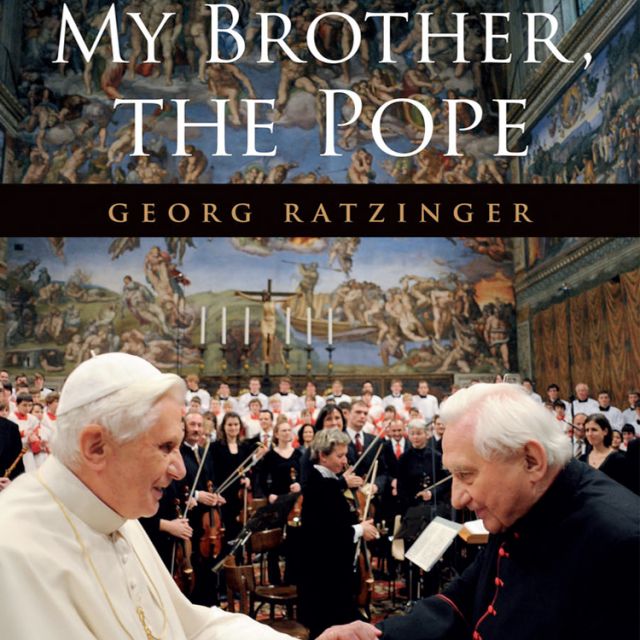Joseph, the future Pope Benedict, was “very slight and delicate” at birth, Ratzinger says, and was “often sick” as an infant. Ratzinger describes family life with their parents and older sister Maria as free of any overt conflict, “since each one settled that himself and with God in personal prayer. We did not talk about such things. ... Such problems became a part of our prayer.”
Glimpses of the boys’ destinies came early on. When a cardinal visited their small town in 1931, arriving in a black limousine, four-year-old Joseph exclaimed, “I’ll be a cardinal someday!” Nevertheless, Ratzinger says, his brother was never ambitious, and external honours have been “always unwelcome” to him.
Recreation of a more edifying sort came when the boys played at being priests, using a toy altar made for them by an uncle.
“It was a really beautiful high altar, which he even equipped with a rotating tabernacle,” Ratzinger recalls. “Naturally we used water instead of wine for the make-believe consecration.”
The future Pope Benedict, now a proficient amateur pianist and lover of Mozart, “did not take to music quite as spontaneously as I did,” says Ratzinger, who went on to become the choirmaster of the Regensburg, Germany, cathedral. His brother “was a little more restrained, although he is a very musical person,” Ratzinger says.
Recounting Hitler’s rise to power in 1930s Germany, Ratzinger says their father regarded the dictator as the “Antichrist” and refused to join the Nazi party.
“But so as not to put our family completely at risk, he advised Mother to join the women’s organization,” Ratzinger says.
It was only reluctantly that the two boys obeyed requirements to join the Hitler Youth and later served in the German military during the Second World War, Ratzinger says.
In 2005, after the death of Blessed John Paul II, Ratzinger was sure his brother was too old to be elected Pope. When he heard the new pontiff’s name pronounced, he admits he was “disheartened.”
“It was a great challenge, an enormous task for him, I thought, and I was seriously worried,” Ratzinger says.
The Pope later confided that his election had “struck him like a bolt of lightning,” Ratzinger says.
Ratzinger says that his brother has not been indifferent to the many criticisms that he has received during his career, as prefect of the Vatican’s Congregation for the Doctrine of the Faith and then as Pope. Pope Benedict is “personally very sensitive, but he also knows from which corner these attacks come and the reason for them, what is usually behind them,” Ratzinger says. “That way he overcomes it more easily, he rises above it more simply.”
A Pope’s story through a brother’s eyes
By Catholic News ServiceROME - Recounting their rural Bavarian childhood and subsequent lifelong friendship, the elder brother of Pope Benedict XVI offers a privileged look at the personal side of the spiritual leader of 1.3 billion Catholics.
My Brother the Pope, published March 1 by Ignatius Press, is based on interviews with Msgr. Georg Ratzinger by German writer Michael Hesemann and was originally published in German last year.
Please support The Catholic Register
Unlike many media companies, The Catholic Register has never charged readers for access to the news and information on our website. We want to keep our award-winning journalism as widely available as possible. But we need your help.
For more than 125 years, The Register has been a trusted source of faith-based journalism. By making even a small donation you help ensure our future as an important voice in the Catholic Church. If you support the mission of Catholic journalism, please donate today. Thank you.
DONATE
